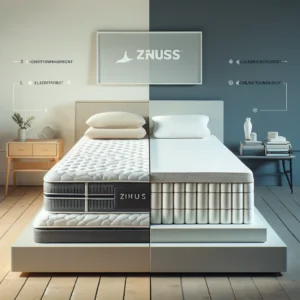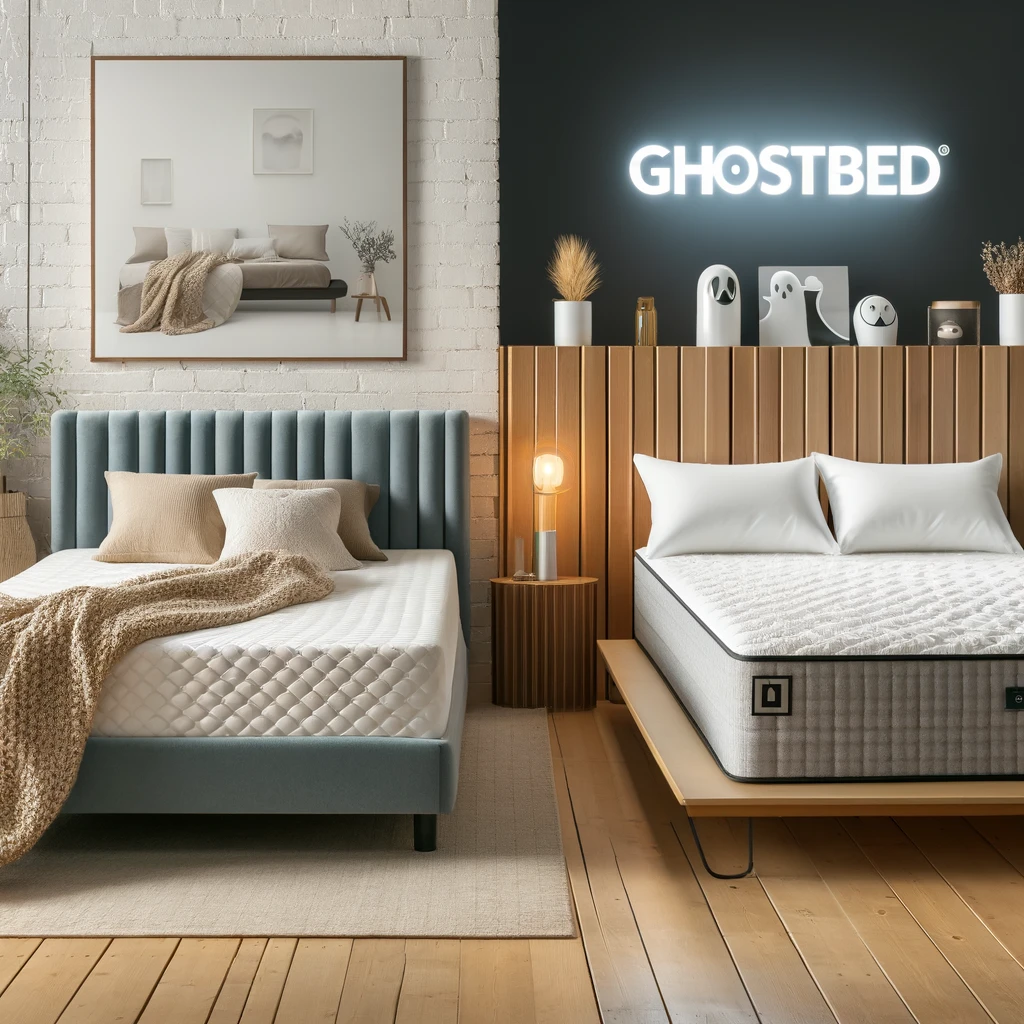Comprehensive Comparison of Zinus vs. GhostBed Mattresses: Making the Right Choice for Your Sleep
When choosing the perfect mattress, the options seem endless, and the decision-making process can be overwhelming. Zinus and GhostBed are popular contenders in the mattress market among the myriad choices available. Both brands offer a range of mattresses designed to cater to different sleep preferences and needs. In this comprehensive comparison, we delve deep into the key aspects of Zinus and GhostBed mattresses to help you make an informed decision. From construction and comfort to pricing and sustainability, we leave no stone unturned in unraveling the intricacies of these mattress giants. So, let’s embark on a journey to discover which mattress brand reigns supreme in the quest for a restful night’s sleep.
Key Takeaways:
- Construction and Comfort: Zinus and GhostBed mattresses vary in materials and firmness levels, catering to various sleep preferences.
- Pricing and Value: While both brands offer competitive pricing, durability and customer satisfaction are crucial in determining each mattress’s value.
- Sustainability and Environmental Impact: With increasing awareness about environmental sustainability, examining Zinus and GhostBed’s eco-friendly practices can help make a conscientious choice.

Construction and Comfort
Regarding mattress construction, Zinus and GhostBed employ distinct materials and technologies to provide optimal comfort and support. Zinus mattresses typically feature layers of memory foam, high-density foam, and pocketed coils. In contrast, GhostBed mattresses boast a combination of latex foam, gel memory foam, and high-density support foam. Choosing these materials often refers to personal preference and desired sleeping experience.
To further illustrate the differences in construction and comfort, let’s take a closer look at the flagship mattresses offered by Zinus and GhostBed:
| Feature | Zinus Mattress | GhostBed Mattress |
| Top Layer | Gel-infused memory foam | Aerated latex foam with cooling properties |
| Middle Layer(s) | High-density foam or pocketed coils for support | Gel memory foam for pressure relief and comfort |
| Base Layer | High-density support foam or pocketed coils | High-density support foam for durability and stability |
| Firmness Options | Typically, medium to medium-firm | Medium-firm to firm, catering to different sleep preferences |
As the table shows, Zinus mattresses prioritize using memory foam for contouring comfort, while GhostBed mattresses focus on providing responsive support with latex and gel memory foam. The firmness options vary between the brands, with Zinus offering a broader spectrum ranging from medium to medium-firm, whereas GhostBed tends to lean towards medium-firm to firm mattresses.
Ultimately, the choice between Zinus and GhostBed mattresses boils down to individual preferences regarding materials, firmness levels, and desired sleeping experience.
Pricing and Value
Pricing and the perceived value a mattress offers are pivotal factors influencing the decision to purchase one. Zinus and GhostBed aim to provide competitive pricing without compromising quality, making them appealing options for budget-conscious consumers. However, beyond the initial price tag, it’s essential to consider factors such as durability, warranty coverage, and customer satisfaction to determine the actual value of each mattress brand.
Let’s compare the pricing and value proposition of Zinus and GhostBed mattresses:
| Brand | Price Range (Queen Size) | Warranty | Trial Period | Customer Satisfaction |
| Zinus | $200 – $600 | 10-12 years | 100 nights | High |
| GhostBed | $700 – $1,500 | 20 years | 101 nights | High |
As depicted in the table, Zinus mattresses are generally more affordable, typically between $200 and $600 for a queen-size mattress. In contrast, GhostBed mattresses command a higher price point, ranging from $700 to $1,500 for the same size. However, GhostBed offers an extensive 20-year warranty compared to Zinus’s 10 to 12-year warranty, potentially enhancing the perceived value over the long term.
Additionally, both brands provide generous trial periods, allowing customers to test the mattresses in the comfort of their homes before making a final decision. Despite the price disparity, customer satisfaction remains high for Zinus and GhostBed mattresses, indicating that affordability doesn’t necessarily equate to compromised quality.
While Zinus may offer a more budget-friendly option upfront, GhostBed’s extended warranty and slightly higher price point may appeal to those seeking long-term durability and peace of mind.

Sustainability and Environmental Impact
In an era of rising environmental consciousness, evaluating mattress brands’ sustainability practices has become increasingly important. From sourcing eco-friendly materials to implementing recycling programs, mattress manufacturers play a significant role in reducing their environmental footprint. Zinus and GhostBed have addressed sustainability concerns and minimized their ecological impact.
Let’s delve into the sustainability initiatives of Zinus and GhostBed:
| Sustainability Practices | Zinus | GhostBed |
| Materials | Use of CertiPUR-US certified foams | Use of CertiPUR-US certified foams and OEKO-TEX certified textiles |
| Packaging | Compressed and rolled packaging | Recyclable and eco-friendly packaging materials |
| Recycling Programs | Partner with recycling facilities | Encourage mattress donation and recycling initiatives |
| Carbon Footprint | Continuous efforts to reduce emissions | Offset carbon footprint through tree planting initiatives |
Zinus prioritizes using CertiPUR-US certified foams, ensuring their mattresses are free from harmful chemicals and substances. Similarly, GhostBed adheres to CertiPUR-US standards for foams and utilizes OEKO-TEX-certified textiles to ensure product safety and sustainability.
Both brands employ eco-friendly packaging materials, with Zinus opting for compressed and rolled packaging to minimize transportation space and reduce carbon emissions. GhostBed goes further by utilizing recyclable materials in their packaging, promoting sustainability throughout the product lifecycle.
Furthermore, Zinus and GhostBed actively participate in recycling programs, encouraging customers to responsibly dispose of their old mattresses. Zinus partners with recycling facilities to facilitate mattress recycling, while GhostBed promotes mattress donation and recycling initiatives to reduce waste and minimize environmental impact.
Both Zinus and GhostBed are committed to ongoing efforts to minimize their carbon footprint. Zinus takes measures to reduce energy consumption and emissions throughout its operations, while GhostBed offsets its carbon footprint through tree-planting initiatives, contributing to reforestation efforts and environmental conservation.
Zinus and GhostBed are committed to sustainability through their choice of materials, packaging practices, recycling initiatives, and efforts to reduce carbon emissions. Consumers can positively impact and contribute to a more sustainable future by aligning with environmentally conscious brands.
FAQs
What are the main differences between Zinus and GhostBed mattresses?
Zinus mattresses typically feature memory foam and pocketed coils, while GhostBed mattresses utilize latex and gel memory foam, offering distinct feels and support.
Which mattress brand offers better value for money?
While Zinus mattresses are more budget-friendly upfront, GhostBed’s extended warranty and higher price point may provide better long-term value.
Do Zinus and GhostBed mattresses offer similar levels of motion isolation?
Both brands employ motion isolation technology, but GhostBed’s use of latex and gel memory foam may offer slightly better motion isolation than Zinus mattresses.
How long do Zinus and GhostBed mattresses typically last?
Zinus mattresses usually last around 6-8 years, while GhostBed mattresses may last up to 7-10 years, depending on usage and maintenance.
What are the environmental considerations when choosing between Zinus and GhostBed?
Both Zinus and GhostBed prioritize sustainability by using CertiPUR-US-certified foams and eco-friendly packaging. Still, GhostBed also utilizes OEKO-TEX-certified textiles and offsets its carbon footprint through tree planting initiatives, making it slightly more environmentally friendly.
Conclusion
The choice between Zinus and GhostBed concerns individual preferences, priorities, and values in the quest for the perfect mattress. At the same time, Zinus offers budget-friendly options with diverse firmness levels and materials. GhostBed appeals to those seeking long-term durability and sustainability with its premium construction and extended warranty. Ultimately, whether you prioritize affordability, comfort, or sustainability, Zinus and GhostBed strive to provide mattresses that cater to diverse needs, ensuring a restful and rejuvenating sleep experience.

